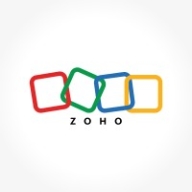

SAP CRM and Zoho CRM are prominent contenders in the CRM software category. The comparison suggests Zoho CRM appears more favorable due to its adaptability, customization, and affordability, especially for small to mid-sized businesses.
Features: SAP CRM provides integration with SAP ERP, robust lead and opportunity management, and powerful sales forecasting. Zoho CRM offers ease of customization, lead management, and extensive integrations.
Room for Improvement: SAP CRM could modernize its design, enhance third-party integration, and improve user experience. Zoho CRM could improve its mobile app, email templates, and social media integration.
Ease of Deployment and Customer Service: SAP CRM offers multiple deployment options, including on-premises and cloud. Customer service requires knowledgeable partners. Zoho CRM's cloud-based model simplifies deployment, and its customer service is known for responsiveness.
Pricing and ROI: SAP CRM is costly, with pricing better suited for large enterprises. Zoho CRM is more affordable, offering flexible subscription plans, appealing to small and mid-sized businesses while maintaining a positive ROI impact.
I am satisfied with their response time and quality.
Sometimes, they don't understand what my actual needs are.
The 1.5 deduction from 10 is due to cultural communication differences based on where we're getting the support, as sometimes it takes a couple of times to communicate clearly enough for them to understand the issue.
There are multiple blogs and articles available online for self-help.
In terms of scalability with data and number of users, I would give it a nine out of ten.
The system is easy to understand, implement coding, and conduct training.
Zoho CRM is quite scalable; I have worked with clients who started with ten companies and have scaled up to managing 500 employees effectively within Zoho CRM.
The platform's global data centers across regions such as the US, EU, and India ensure data security and privacy through ISO certification and strong role-based security, which is essential for handling sensitive customer data.
Zoho CRM guarantees 99% uptime, with downtime incidents being very rare.
I find Zoho CRM to be 100% stable and reliable as far as I know.
It is usually compliant with data regulation laws and is HIPAA compliant.
I am happy with SAP CRM because whenever we have requirements for changes or customization as per our needs, we get them, and the downtime is minimal.
The platform does not save code versions similar to GitHub, where you can compare new versions with previous ones.
Some organizations may prefer not to have their data on the internet since Zoho CRM runs as a cloud service.
The main improvement needed for Zoho CRM is introducing SQL code for reports, similar to what's in Zoho Analytics.
SAP CRM is not suitable for small companies because of the cost.
Zoho CRM and all of Zoho's software are quite affordable because they are specifically designed for small and medium businesses.
In terms of my experience with the price and licensing cost, as with setup cost for Zoho CRM, it might not be quite affordable because there are cheaper solutions available.
If there is any error in our machine, a log is automatically generated, and from SAP CRM, we can see that the machine has problems.
The most valuable aspect of CRMs, including Zoho CRM, Salesforce, and Microsoft Dynamics, is automation capabilities.
The most valuable feature I have found in Zoho CRM is custom functions. You can achieve anything with it. From integrations with other applications, it is instant.
You can customize everything—what you sell, be it products, services, or projects.
| Product | Market Share (%) |
|---|---|
| SAP CRM | 2.1% |
| Zoho CRM | 1.6% |
| Other | 96.3% |

| Company Size | Count |
|---|---|
| Small Business | 14 |
| Midsize Enterprise | 5 |
| Large Enterprise | 27 |
| Company Size | Count |
|---|---|
| Small Business | 44 |
| Midsize Enterprise | 6 |
| Large Enterprise | 10 |
SAP CRM is a comprehensive customer relationship management solution that helps businesses streamline their sales, marketing, and service processes. It offers a range of features including lead management, opportunity management, campaign management, and customer service management. With SAP CRM, businesses can effectively manage their customer interactions, improve customer satisfaction, and drive revenue growth.
The solution integrates with other SAP modules, allowing for seamless data exchange and real-time insights. It also offers mobile access, enabling sales and service teams to access critical information on the go.
SAP CRM is a powerful tool for businesses looking to enhance their customer relationships and drive business success.
Zoho CRM empowers organizations with a complete customer relationship lifecycle management solution for managing organization-wide Sales, Marketing, Customer Support & Service and Inventory Management.
We monitor all CRM reviews to prevent fraudulent reviews and keep review quality high. We do not post reviews by company employees or direct competitors. We validate each review for authenticity via cross-reference with LinkedIn, and personal follow-up with the reviewer when necessary.